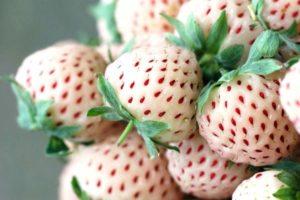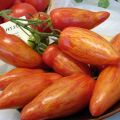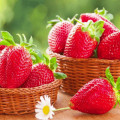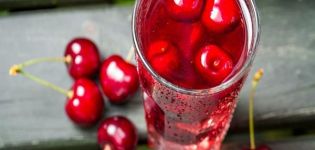Description of strawberry varieties Moscow delicacy, planting and care
A hybrid variety widespread in the CIS countries, created by Dutch breeders. The main feature of the Moscow Delicacy strawberry is its development regardless of daylight hours. Kidney formation occurs at any level of sunlight. The repaired variety is popular due to its good taste, abundant formation of berries during the second fruiting season.
Description of culture
The repaired medium-sized hybrid does not take up much space on the site, since the bushes are compact, the stems do not stretch above 40 cm, the leaves are located close to each other. The Moscow delicacy variety is not characterized by abundant mustache formation.
Description of the plant:
- leaf plates are rich green, slightly pubescent;
- stems are thin, tough, pale green;
- the root system is developed, reaches a depth of 7 cm, the roots are evenly distributed in different directions;
- flowers are hidden under leaves;
- the fruit is cone-shaped, with a blunt tip, weighs about 60 g;
- the surface of the berry is smooth, red, light brown achenes stand out on it;
- the pulp is sweet, without sugary, with a slight sourness, tasting score - 4.7 points.
Characteristics of strawberries Moscow delicacy
Repairing strawberries with neat bushes and large fruits grow both in greenhouse conditions and in the open field. The plant lives and bears fruit for up to 5 years.

Flowering period, ripening time, yield
Strawberries bloom Moscow delicacy at the end of May. Well-cared plants produce their first harvest of the season in early June. The second batch of berries can be picked in August.
The second yield is higher, accounting for about 70% of the total harvest for the season. One bush per year gives up to 1.2 kg of fruit.
The berries are well stored, do not lose their commercial appeal during long-term transportation, so many farmers grow Moscow delicacy strawberries for sale.
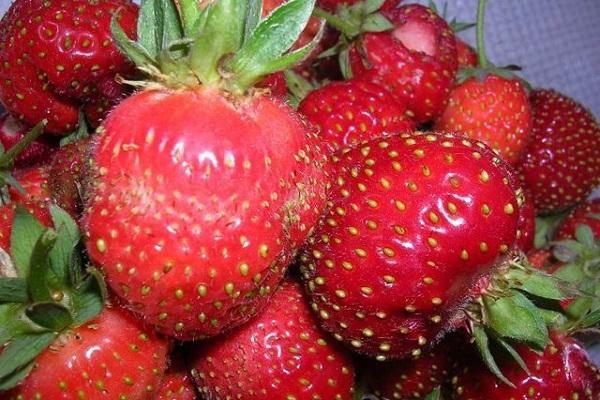
Application area
The berries are suitable both for fresh consumption and for cooking:
- jam;
- fruit salad;
- compote;
- dessert baking;
- berry ice;
- vitamin cocktails.
For long-term storage, strawberries are frozen.
Disease and pest resistance
The Moscow delicacy variety is characterized by a fairly strong immunity.With proper care, adherence to the watering regime, the roots are not affected by fungal infection, and aerial shoots are not affected by pests.
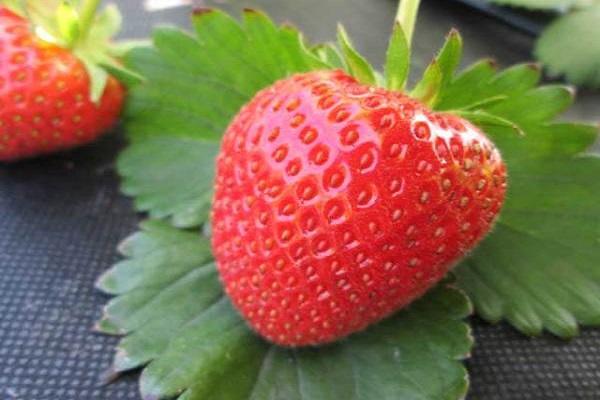
Main positive and negative aspects
The Moscow delicacy variety has been popular with gardeners for a long time. Its main advantages:
- early ripening;
- high productivity;
- transportability;
- the possibility of growing all year round, in the warm season - in the open field, in the cold season - in the greenhouse;
- resistance to most pathologies typical for berry crops.
Among the disadvantages are:
- the need to shelter the plantation for the winter;
- weak mustache formation (one mustache per 6-8 plants);
- the need to renew the plantation every 4-5 years.
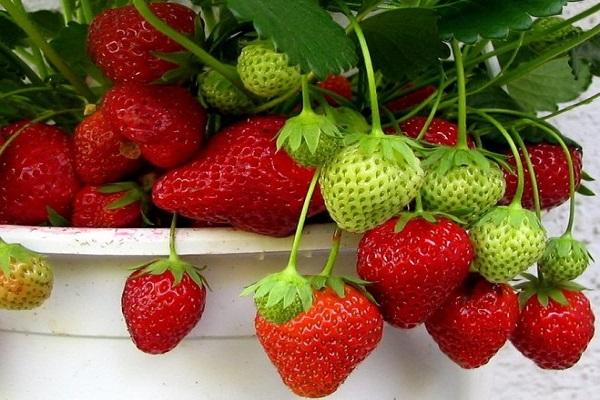
The subtleties of growing varieties
In each region, the planting time is determined by weather conditions, but strawberries are planted only after the soil warms up to +18 ° C.
When forming a strawberry plantation, it is important to consider crop rotation. The best area for strawberries, where they used to grow:
- siderates (it is advisable to embed them in the soil when digging);
- legumes;
- garlic, onions;
- roots.
Do not plant strawberries in an area where nightshades grew. These crops have similar diseases.
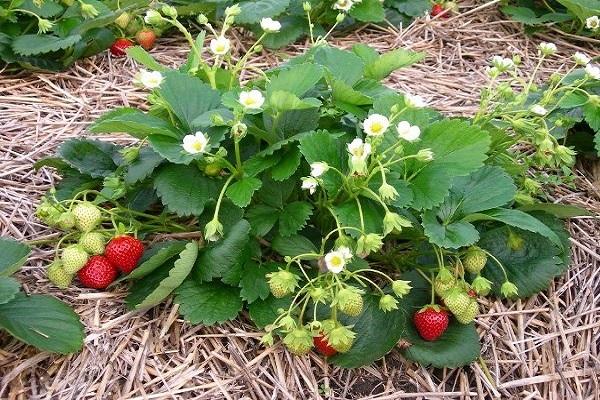
Choosing the best seedlings for planting
Seedlings should be purchased from the nursery and not from hand. High-quality planting material has not only last year's foliage, but also at least two young leaves. Leafy plates of a rich color, slightly pubescent, without deformation and traces of disease. The thickness of the lower part of the stem should be about 0.7 cm. The root system of development, the roots are elastic, curving, moist, without traces of damage by insects.
Before planting, it is advisable to decontaminate the roots: immerse them in a pale manganese solution for 15 minutes.
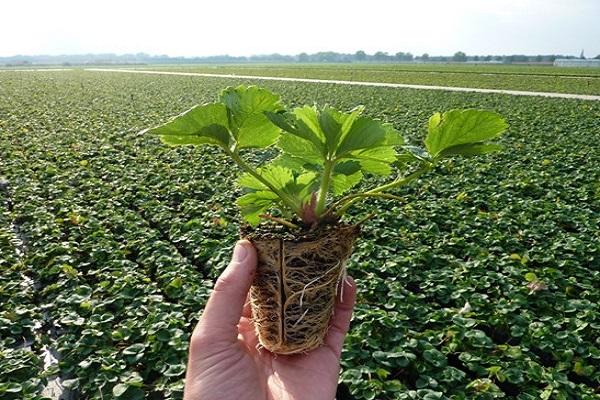
Selection of a landing site
Grow the strawberries in a sunny location. The plantation is laid out in the southern part of the garden. The place should be elevated, protected from strong winds. It is unacceptable to plant in a lowland, where there is a high probability of decay of roots and shoots due to high humidity.
The soil in the selected area is prepared 2 weeks before planting:
- dig up;
- weeds are removed;
- make organic matter and sand in a ratio of 2: 1.
Landing technology
Planting strawberries is carried out according to the following algorithm:
- landing holes are made at a distance of 40 cm from each other;
- to save space and ease further care, planting is carried out by a two-row method (the distance between the rows is 20-25 cm, between the stripes - 60 cm);
- a little ash is poured into the holes (it will speed up rooting);
- the plant is carefully placed in the hole, covered with earth, watered.
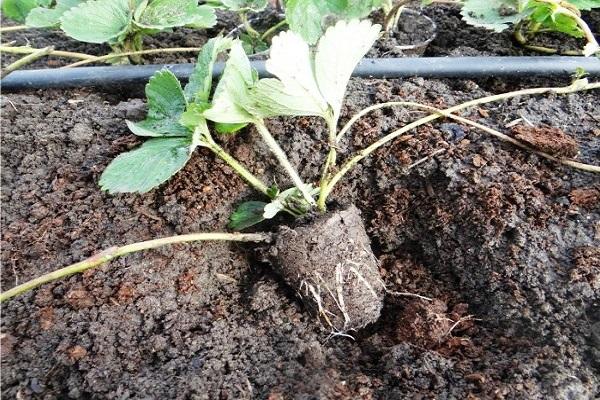
Nuances of culture care
Strawberry Moscow delicacy is not capricious, but there are certain nuances of cultivation. One of the main features of the variety is its extreme sensitivity to waterlogging of the soil, so irrigation control must be careful.
With excessive moisture, the surface of the berries cracks. With a moisture deficit, the taste of the fruit deteriorates.
Watering frequency
The first days after planting, strawberries are watered daily, but in moderation. Use lukewarm water. After rooting, watering is reduced, its frequency is correlated with weather conditions. If there are hot days without precipitation, then water it 3 or 4 times a week.
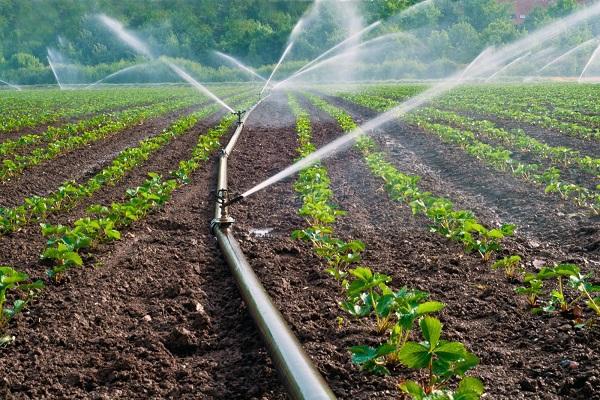
Fertilizers and feeding
Feeding strawberries is carried out according to the following scheme:
- at the beginning of the growing season, the earth is watered with ammonia solution to accelerate the development of greenery;
- potash fertilizer is applied in the flowering phase, the use of organic matter and ash is permissible;
- to increase the number of inflorescences, spraying with a solution of boric acid is carried out (a teaspoon of the substance per 10-liter bucket of water);
- the development of strawberries is positively influenced by the introduction of manure infusion.
With an excess of nitrogen in the soil, strawberries produce small and sour fruits.
Preparing for winter
The Moscow delicacy variety is characterized by low frost resistance. Therefore, for the winter, the plantation must be covered with agrofibre or other insulating material. Some summer residents put spruce paws on the bushes, pour soil on top, and in winter they throw more snow.
Before winter warming, strawberries are cut, leaf litter is raked. The soil is treated with drugs to prevent infection.
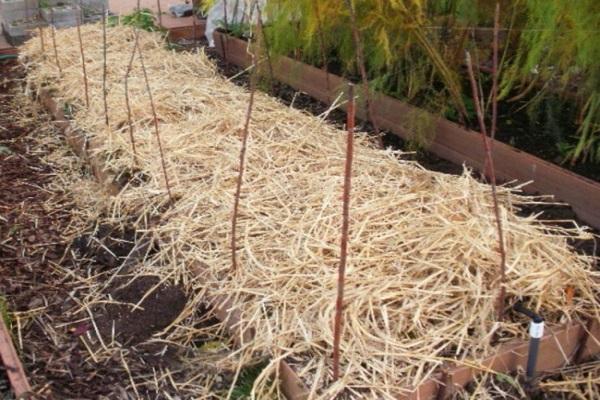
Diseases and pests
The Moscow delicacy variety is immune to infection and insects. But sometimes strawberries are amazed:
- Strawberry mites, capable of emptying a berry in two years. These insects lay their eggs on the underside of the leaf plates. They live where heat is combined with high humidity. Symptoms of the lesion are drying of shoots, the formation of small dry fruits. Fight the pest with insecticides. For prevention, the berry is treated with Bordeaux solution, weeds are pulled out in a timely manner, the soil is loosened after harvesting.
- Nematodes. Symptoms are the drying out of the berries before ripening. A plant affected by worms will have to be dug up and destroyed, otherwise the pest will spread to other bushes.
- Fungal infection. To prevent it, every season in early spring and autumn, the site is treated with a solution of copper sulfate.
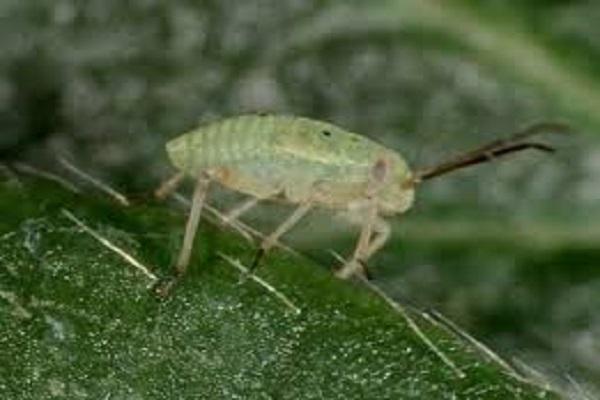
Breeding methods
Strawberry propagation is possible Moscow delicacy:
- seeds;
- assignment of sockets;
- dividing the bush.
The most used method is seed. Since strawberries produce few whiskers, it is rarely possible to propagate them in a rosette way.
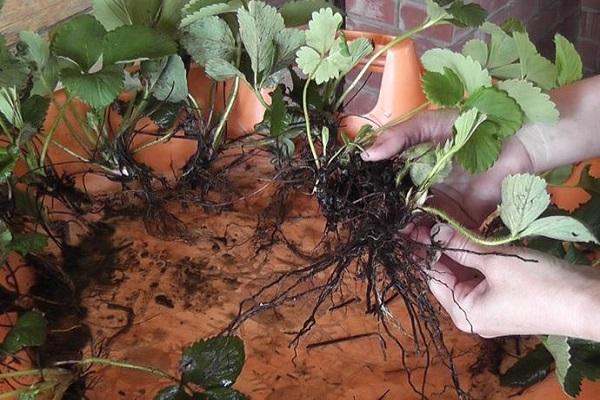
Harvesting and storage technology
If strawberries are intended for sale and long-term transportation, then the stalk cannot be torn off during harvesting. Berries of the Moscow delicacy variety will not ripen; if picked ahead of time, they will remain sour. Therefore, only fruits that have reached full maturity are harvested..
The crop is stored for about 3 days in a cool dry room or 5 days in the refrigerator. The frozen berry retains its shape and useful qualities.
